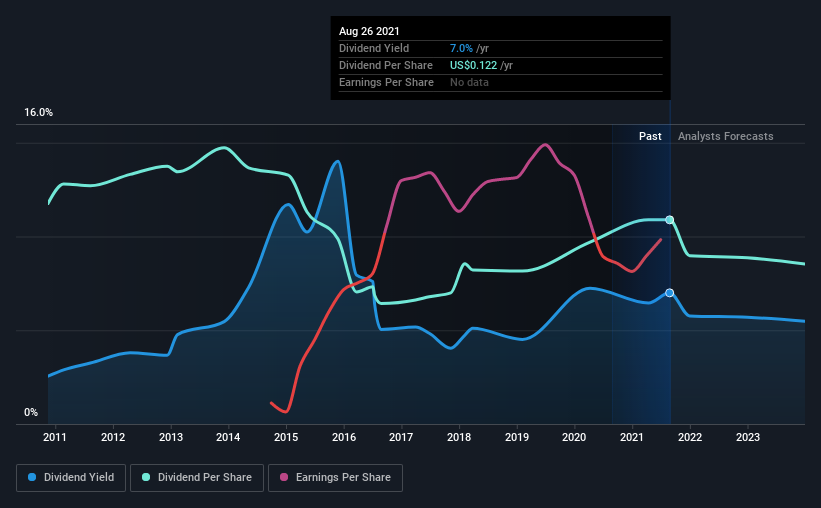Anglo Pacific Group's (LON:APF) Dividend Will Be UK£0.018
The board of Anglo Pacific Group plc (LON:APF) has announced that it will pay a dividend of UK£0.018 per share on the 10th of November. Including this payment, the dividend yield on the stock will be 5.7%, which is a modest boost for shareholders' returns.
See our latest analysis for Anglo Pacific Group
Anglo Pacific Group's Distributions May Be Difficult To Sustain
The dividend yield is a little bit low, but sustainability of the payments is also an important part of evaluating an income stock. Even though Anglo Pacific Group is not generating a profit, it is still paying a dividend. Along with this, it is also not generating free cash flows, which raises concerns about the sustainability of the dividend.
Recent, EPS has fallen by 18.8%, so this could continue over the next year. This will push the company into unprofitability, which means the managers will have to choose between suspending the dividend, or paying it out of cash reserves.
Dividend Volatility
Although the company has a long dividend history, it has been cut at least once in the last 10 years. Since 2011, the first annual payment was US$0.13, compared to the most recent full-year payment of US$0.12. The dividend has shrunk at a rate of less than 1% a year over this period. Generally, we don't like to see a dividend that has been declining over time as this can degrade shareholders' returns and indicate that the company may be running into problems.
The Dividend Has Limited Growth Potential
With a relatively unstable dividend, it's even more important to see if earnings per share is growing. Over the past five years, it looks as though Anglo Pacific Group's EPS has declined at around 19% a year. A sharp decline in earnings per share is not great from from a dividend perspective. Even conservative payout ratios can come under pressure if earnings fall far enough.
We'd also point out that Anglo Pacific Group has issued stock equal to 18% of shares outstanding. Regularly doing this can be detrimental - it's hard to grow dividends per share when new shares are regularly being created.
Anglo Pacific Group's Dividend Doesn't Look Great
Overall, this isn't a great candidate as an income investment, even though the dividend was stable this year. The company seems to be stretching itself a bit to make such big payments, but it doesn't appear they can be consistent over time. Overall, the dividend is not reliable enough to make this a good income stock.
Companies possessing a stable dividend policy will likely enjoy greater investor interest than those suffering from a more inconsistent approach. Meanwhile, despite the importance of dividend payments, they are not the only factors our readers should know when assessing a company. For instance, we've picked out 3 warning signs for Anglo Pacific Group that investors should take into consideration. If you are a dividend investor, you might also want to look at our curated list of high performing dividend stock.
This article by Simply Wall St is general in nature. We provide commentary based on historical data and analyst forecasts only using an unbiased methodology and our articles are not intended to be financial advice. It does not constitute a recommendation to buy or sell any stock, and does not take account of your objectives, or your financial situation. We aim to bring you long-term focused analysis driven by fundamental data. Note that our analysis may not factor in the latest price-sensitive company announcements or qualitative material. Simply Wall St has no position in any stocks mentioned.
Have feedback on this article? Concerned about the content? Get in touch with us directly. Alternatively, email editorial-team (at) simplywallst.com.

 Yahoo Finance
Yahoo Finance 
